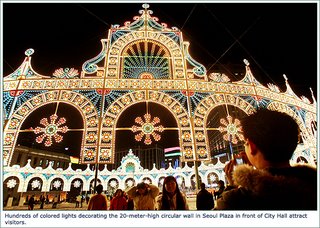
Here is some additional information on the Holidays in Korea past and present....
As noted in previous postings, Sae hae bok mani ba deu say yo is a popular holiday greeting and translates as Seasons Greetings.
For those who wish to say Merry Christmas in Korean. There are two Merry Christmas greetings:
Sung tan jul chuk ha or Christmas bo nae say oh
So, did Korea have a seasonal holiday before Christian Christmas?
(BTW The first official Western style Christmas was celebrated in 1894).
Yes, Dongji, or the winter solstice, was a significant event in Old Korea. It was when the days started to become longer than the nights. To celebrate this, people offered rituals for the gods and their ancestors. The day was calling A-Se or little New Year's Day.
Traditionally the winter solstice, which falls on December 21-22, was a time to makeup a new calendar and mark it with the seasonal sub divisions corresponding with the agricultural seasons. In Korea, this tradition lives on today in the modern practice of giving calendars as year-end gifts.
Although Dongji is no longer considered as major a holiday as Chuseok (Harvest Full Moon) and Seol (Lunar New Year's Day), there still some who celebrate Dongji.
One of the most common customs is cooking and eating red bean porridge, or patjuk.
The reason behind this custom is that Korean people believed that red beans have a mysterious power of driving evil spirits away. In Old Korea, people thought evil spirits hated the red color.
Religious services will also be held on Dongji in many Buddhist temples across the country.
Comments, questions?
Sae hae bok mani ba deu say oh! (Happy Holidays)
No comments:
Post a Comment